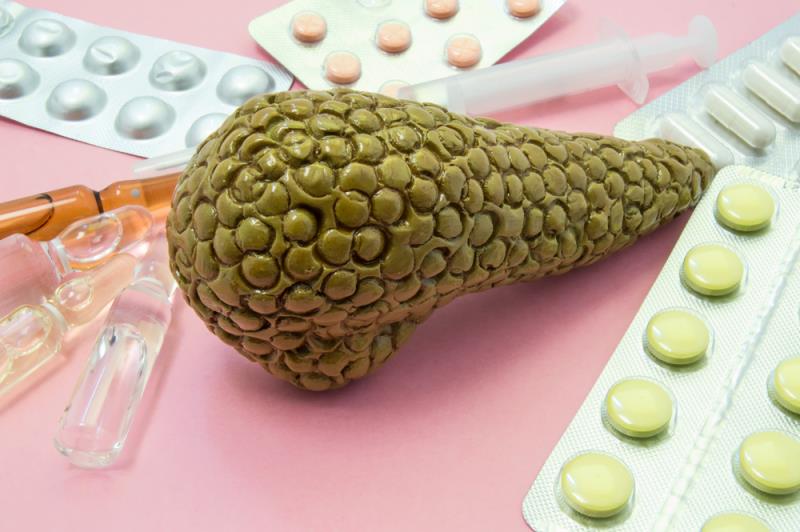
Patients with pancreatic cancer with actionable mutations may have their overall survival (OS) extended by 1 year with molecularly matched therapies compared with unmatched therapies, a retrospective analysis of real-world data has shown.
The analysis included 677 of 1,856 adult patients with pancreatic cancer of any stage in the US who were referred to the Pancreatic Cancer Action Network’s Know Your Tumor (KYT) registry between June 2014 and March 2019. A total of 1,082 patients received personalized reports based on molecular testing results (pancreatic ductal adenocarcinoma, n=1,005; adenosquamous carcinoma, n=11; acinar cell carcinoma, n=12). Among these patients, 282 (26 percent) were found to have actionable molecular alterations in their tumours. [Lancet Oncol 2020, doi: 10.1016/S1470-2045(20)30074-7]
In the analysis cohort of 677 patients (median age, 62 years; 53 percent male), 189 had actionable molecular alterations. Among these 189 patients, 46 (24 percent) received a molecularly matched therapy, which included small molecule inhibitors, immune checkpoint inhibitors and anti-HER2 antibodies, while 143 (76 percent) received unmatched therapy (ie, chemotherapy).
After a median follow-up of 383 days, the primary outcome of median OS, measured from the time of diagnosis of advanced disease, was 2.58 years in the matched therapy group vs 1.51 years in the unmatched therapy group (hazard ratio [HR], 0.42; 95 percent confidence interval [CI], 0.26 to 0.68; p=0.0004) and 1.32 years in patients with no actionable molecular alterations (ie, no marker group; n=488) (HR, 0.34; p<0.0001).
“Notably, these results held true even when we separated out the subgroup of patients with DNA damage response [DDR] mutations, who are known to benefit from treatments such as platinum-based chemotherapy and DDR inhibitors,” the investigators noted.
In patients with actionable DDR mutations (n=94), median OS was significantly longer in those who received matched therapy with a poly(ADP-ribose) polymerase (PARP) inhibitor or an ATR inhibitor (n=27) vs unmatched therapy (n=67) (3.81 years vs 1.71 years; HR, 0.48; p=0.033).
In patients with non-DDR actionable molecular alterations (n=95), median OS was also significantly longer among those treated with a matched therapy (n=19) vs unmatched therapy (n=76) (2.39 years vs 1.31 years; HR, 0.40; 95 percent CI, 0.20 to 0.78; p=0.0076).
Most patients in the cohort received molecularly matched therapy as second-line or later-line treatment. In this setting, median progression-free survival was significantly longer with matched therapy (10.93 months) compared with unmatched therapy (4.53 months; HR, 0.50; 95 percent CI, 0.29 to 0.86; p=0.0124) and the no marker group (5.37 months; HR, 0.53; 95 percent CI, 0.32 to 0.87; p=0.0122).
According to the investigators, this proof-of-concept study is the first that compared the outcomes of pancreatic cancer patients with actionable molecular alterations who received matched vs unmatched therapies.
“These real-world outcomes suggest that adoption of precision medicine can have a substantial effect on survival in patients with pancreatic cancer, and that molecularly guided treatments targeting oncogenic drivers and the DDR pathway warrant further prospective evaluation,” they concluded.
“However, several important questions remain to be addressed. These questions comprise not only the technical details regarding genome sequencing of tumour tissues and germline material, but also clinical questions such as timing of treatment and choice of the right chemotherapy (backbone), as well as identification of appropriate combination treatment regimens,” wrote Dr Jörg Kleeff and Dr Christoph W. Michalski of University Halle-Wittenberg, Halle, Germany, in a linked comment. [Lancet Oncol 2020, doi: 10.1016/ S1470-2045(20)30148-0]